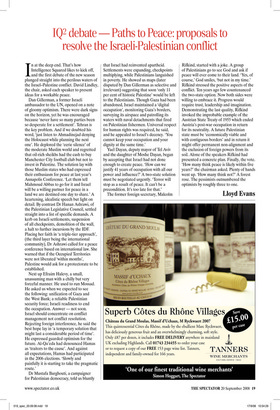IQ 2 debate — Paths to Peace: proposals to
resolve the Israeli-Palestinian conflict
In at the deep end. That’s how Intelligence Squared likes to kick off, and the first debate of the new season plunged straight into the perilous waters of the Israel–Palestine conflict. David Lindley, the chair, asked each speaker to present ideas for a workable peace.
Dan Gillerman, a former Israeli ambassador to the UN, opened on a note of gloomy optimism. There were dark signs on the horizon, yet he was encouraged because ‘never have so many parties been so desperate for a settlement’. Tehran is the key problem. And if we doubted his word, ‘just listen to Ahmadinejad denying the Holocaust while planning the next one’. He deplored the ‘eerie silence’ of the moderate Muslim world and regretted that oil-rich sheikhs had the cash to buy Manchester City football club but not to invest in Palestine. The solution lay with those Muslim states who had expressed their enthusiasm for peace at last year’s Annapolis Conference. ‘Let them tell Mahmoud Abbas to go for it and Israel will be a willing partner for peace in a land we are destined one day to share.’ A heartening, idealistic speech but light on detail. By contrast Dr Hanan Ashrawi, of the Palestinian Legislative Council, settled straight into a list of specific demands. A kerb on Israeli settlements, suspension of all checkpoints, demolition of the wall, a halt to further incursions by the IDF. Placing her faith in ‘a triple-tier approach’, (the third layer being the international community), Dr Ashrawi called for a peace conference based on international law. She warned that if the Occupied Territories were not liberated ‘within months’, Palestine would ask for a protectorate to be established.
Next up Efraim Halevy, a small, unassuming man with a chilly but very forceful manner. He used to run Mossad. He asked us when we expected to see the following: unification of Gaza and the West Bank; a reliable Palestinian security force; Israeli readiness to end the occupation. Answer — not soon. Israel should concentrate on conflict management not conflict resolution. Rejecting foreign interference, he said the best hope lay in ‘a temporary solution that might last a considerable period of time’. He expressed guarded optimism for the future. Al-Qa’eda had denounced Hamas as ‘traitors to the cause’. And against all expectations, Hamas had participated in the 2006 elections. ‘Slowly and painfully it is starting to take the pragmatic route.’ Dr Mustafa Barghouti, a campaigner for Palestinian democracy, told us bluntly that Israel had reinvented apartheid. Settlements were expanding, checkpoints multiplying, while Palestinians languished in poverty. He showed us maps (later disputed by Dan Gillerman as selective and irrelevant) suggesting that soon ‘only 11 per cent of historic Palestine’ would be left to the Palestinians. Though Gaza had been abandoned, Israel maintained a ‘digital occupation’, monitoring Gaza’s borders, surveying its airspace and patrolling its waters with naval detachments that fired on Palestinian fishermen. Universal respect for human rights was required, he said, and he appealed to Israel’s decency. ‘You cannot keep your occupation and your dignity at the same time.’ Yael Dayan, deputy mayor of Tel Aviv and the daughter of Moshe Dayan, began by accepting that Israel had not done enough to create peace. ‘How can we justify 41 years of occupation with all our power and influence?’ A two-state solution
NAL 2008:SPECTATORChâteau du G
must be negotiated urgently. ‘Terror will stop as a result of peace. It can’t be a precondition. It’s too late for that.’ The former foreign secretary, Malcolm Rifkind, started with a joke. A group of Palestinians go to see God and ask if peace will ever come to their land. ‘Yes, of course,’ God smiles, ‘but not in my time.’ Rifkind stressed the positive aspects of the conflict. Ten years ago few countenanced the two-state option. Now both sides were willing to embrace it. Progress would require trust, leadership and imagination. Demonstrating the last quality, Rifkind invoked the improbable example of the Austrian State Treaty of 1955 which ended Austria’s post-war occupation in return for its neutrality. A future Palestinian state must be ‘economically viable and with contiguous borders’ and in return it might offer permanent non-alignment and the exclusion of foreign powers from its soil. Alone of the speakers Rifkind had presented a concrete plan. Finally, the vote. ‘How many think peace is likely within five years?’ the chairman asked. Plenty of hands went up. ‘How many think not?’ A forest rose. The pessimists outnumbered the
Moulas 21/08/2008 09:25 Pae
optimists by roughly three to one.
Lloyd Evans










































































 Previous page
Previous page